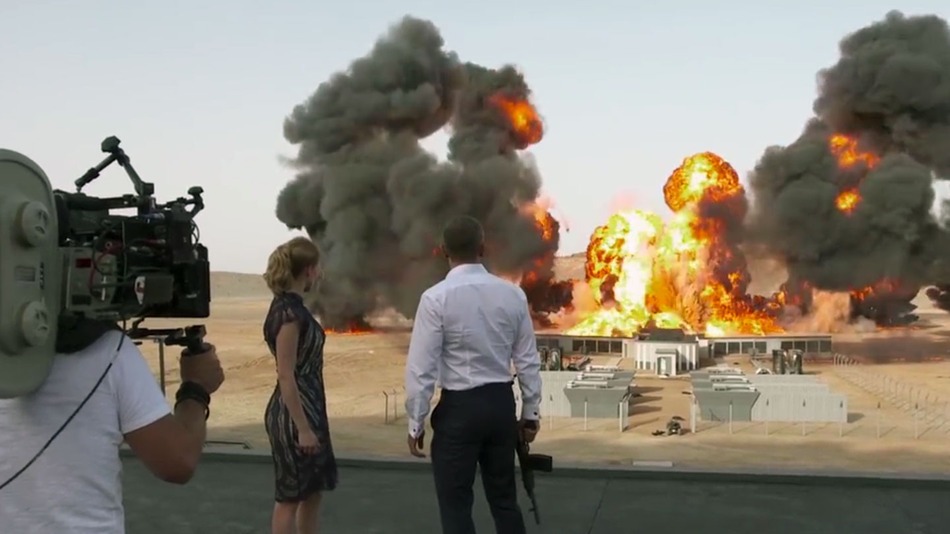
The old Bond died in 2006 with Daniel Craig’s portrayal of the secret agent in Martin Campbell’s Casino Royale. The timeworn 007 was then buried deep in Skyfall (2012). In the latter film, director Sam Mendes introduced a sombre, more serious superspy and he altered the conventional narrative arc of the Bond film. The resurrection of the older-era 007 in Spectre (2015) surely came as a surprise.
In Spectre, we do see the death of Bond in three other senses: the obsolescence of the “Double O” program, replaced with a new global surveillance system implemented by the secondary villain Max Denbigh a.k.a. C (Andrew Scott); Mendes’s choice to not further his investigation of the personality and history of Craig’s Bond; and the end of Craig as Bond.
Craig recently said that he would rather ‘slit his wrists’ than play Bond again, at least for a year or two. However, on December 1, Barbara Broccoli stated that they would be going ahead with the next Bond film in the Spring. She expressed her desire for Craig to return, but with the rumours and discussion circulating around Idris Alba and Hugh Jackman, a new Bond seems likely.
So, there was something exciting about watching Craig have one last conventionally Bond adventure. Spectre is a continuation of the story in Casino Royale, Quantum of Solace (Marc Forster, 2008), and Skyfall to be sure; however, to base an evaluation of Spectre solely on the series narrative trajectory and tone misses the larger context of the film-production machine known as the Broccoli family (Albert R. and Barbara, respectively).
Spectre isn’t just EON Productions’s bid at an action film for box office revenues or part of a short-lived quadrilogy. The Bond films have carved out an important place in cinema’s history. Spectre is thus a film for the Bond cinephile. The 24th film restages and reinvents the familiar formulas with a self-conscious flare.
We might do ourselves a greater service by catching up on past films with Ernst Stavro Blofeld, Bond’s most frequent rival. Indeed, Spectre borrows elements from every Bond film, not just Craig’s run. Among others, Spectre’s clinic at the top of a snowy, Austrian mountain similarly appears in On Her Majesty’s Secret Service (Peter Hunt, 1969); the opening sequence set in Mexico City on the Day of the Dead has parallels in Live and Let Die’s New Orleans (Guy Hamilton, 1973); the train-fight sequence is surely referencing From Russia with Love (Terence Young, 1963); and Dave Bautista’s henchman undoubtedly resembles Jaws (Moonraker [Lewis Gilbert, 1979]).
One of the standard plot events of a Bond film is to have 007 infiltrate a villain’s hideout under a pseudonym or be invited there by the villain himself. From within the villain’s lair, Bond is able to stop whatever evil deeds are taking place while simultaneously engaging in entertaining dialogue with the man he is tasked to kill.
Spectre accomplishes this with modest success. Blofeld, played poorly by Christoph Waltz, welcomes Bond and his current lover, Dr. Madeleine Swann (Léa Seydoux), to his desert stronghold and unveils evil plans to keep the entire world under surveillance. While the sequence lacks the temporal longevity of the final act in Majesty’s Secret Service or the tension of dining with your assassin in The Man with the Golden Gun (Hamilton, 1974), it does allow Craig and Seydoux a brief moment of emotional intimacy as the latter watches surveillance footage of her father’s suicide.
Upon Bond and Dr. Swann’s spectacular escape from Blofeld’s hideout, and after 007’s well-placed shot on a chemical storage container, the explosive but penultimate finale sets a new Guinness world record for largest film stunt explosion. Craig and Seydoux are almost silhouetted as the entire facility is blown to pieces. Alongside the remarkable opening sequence – a five-minute tracking shot through the Day of the Dead, an assassination, a building explosion, and a climactic helicopter fight – this was one of the highlights.
On the downside, Spectre may be Craig’s weakest performance as Bond, although he is able to revive some of the irony used in earlier films, particularly in his cheeky exchanges with M, Q, and Moneypenny. Further, except for M (Ralph Fiennes), these characters are sometimes wonderfully given life outside the conventional exchanges with Bond. Ben Whishaw’s Q was outstanding in performance and in the plot of the film. In an effort to script better female characters, Naomie Harris’s Moneypenny outwardly rejects Bond’s advances and later, is interrupted post-coitus by an urgent call from the spy during the middle of a tense car chase sequence in the alleys of Rome.
Spectre enlivened my recent experiences with Bond. Quantum was a dud and Skyfall’s meanderings into Bond’s personal history and the home invasion genre left me bored. Spectre does not compare to Casino Royale, but it is exactly what the Bond fan should want.


